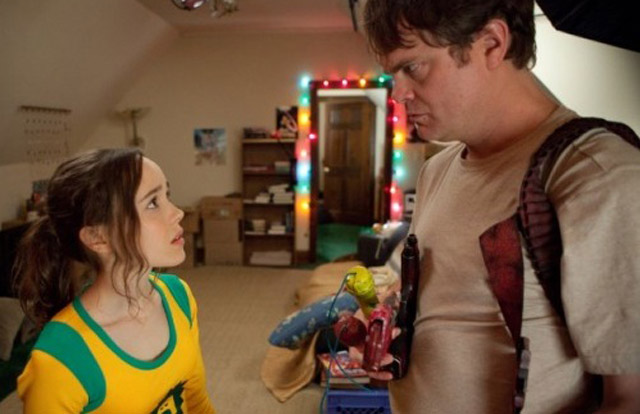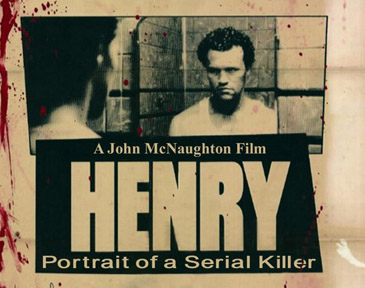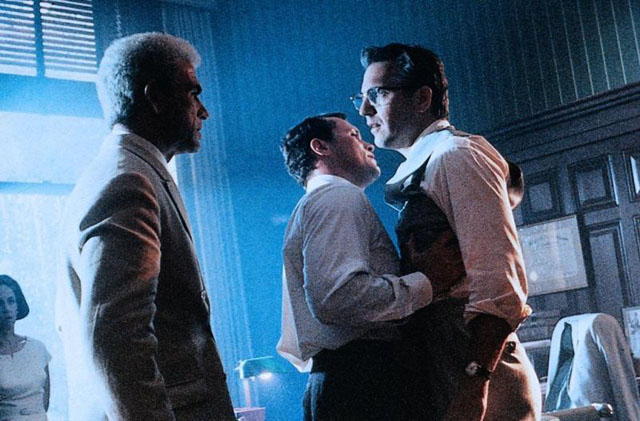CHICAGO – Patrick McDonald of HollywoodChicago.com appears on “The Morning Mess” with Dan Baker on WBGR-FM (Monroe, Wisconsin) on March 21st, 2024, reviewing the new streaming series “Manhunt” – based on the bestseller by James L. Swanson – currently streaming on Apple TV+.
Interview: Actor Michael Rooker is Feeling Just ‘Super’
CHICAGO – Michael Rooker, who grew up in Chicago as a developing actor and had his first breakout role in the locally filmed “Henry: Portrait of a Serial Killer,” is currently featured in the audacious new film “Super,” starring Rainn Wilson and Ellen Page.
Rooker plays Abe, a henchman to crime boss Jacque (Kevin Bacon), as they try to thwart the meanderings of vigilante costumed heroes named the Crimson Bolt (Rainn Wilson) and Boltie (Ellen Page). Raw, poignant and strangely probable, Super is a unusual take on a comic book situation, as if they decided to take those familiar heroics into a desperate real-life situation.
 Photo credit: IFC Films |
Michael Rooker has had an essential career as a character actor. After studying acting at the Goodman School of Drama in Chicago, he broke out in a big way as the title character in the cult horror film, “Henry, Portrait of a Serial Killer” (1986). From there he went on to familiar roles in mainstream films like “Eight Men Out” (1988), “Mississippi Burning” (1988), “JFK” (1991), “Tombstone” (1993), “The Replacement Killers” (1998), “Replicant” (2001) and “Jumper” (2008).
Although he mostly plays criminals or heavies, Rooker is energetic and funny in person, with a deep appreciation for his successful career and actor’s journey. HollywoodChicago.com caught up with him last week when he was in town to introduce a screening of “Super” at the Music Box Theatre here.
HollywoodChicago: ‘Super’ is writer and director James Gunn’s film debut. What is your technique and method when interacting with new directors on each film and how do veteran actors tend to help out newbies like Gunn on his first film set?
Michael Rooker: James Gunn doesn’t like a lot of help, he thinks he knows everything. [laughs] First off, you have to convince them that they don’t know everything, and they need your help. With Gunn, I had my work cut out for me.
Actors do tend to want to help new directors, but many of them don’t need it. I’ve learned over the years that it is better to just to keep your mouth shut, do your job and if the director wants your advice, he’ll ask for it.
HollywoodChicago: This film is both an homage and a counterpoint to the comic book film. What are your favorite elements about comic book heroes, and what do you think Super teaches us about their potential real-world implications?
Rooker: It’s like we’re all digging the comic book heroes these days. But they are written in a way like they’re for children, we learn the the moral of the story from a super hero. As adult people who dig them, it says something kind of strange, as if we haven’t learned what we needed to learn back we were eight and nine, and so we have to do it now. Super is strange because Rainn Wilson’s character is somewhat of a psychopath, he’s crazy. But he does such a great job with it.
HollywoodChicago: Your criminal henchman character seems to be conflicted regarding the situation in the film. What were the nuances that you and Gunn were giving him to make him different than the other immoral characters in the film?
Rooker: It’s a smaller role, and a lot of my work is done without many lines. I have to figure out as an actor to make this a full fledged rounded out character. Which is kind of fun because you get to imagine it and think about it yourself, it’s not in the script yet.
That’s what we did with the character of Abe. Me and Gunn were chit-chatting a little bit and I was thinking that maybe I just like her [Liv Tyler’s character], I secretly like her, and that fueled a lot of the moral dilemma that Abe was going through. That was the handle we through in to flesh out the moments when I wasn’t saying anything.
HollywoodChicago: How many times have you died on film?
Rooker: I don’t die a lot, I’m usually the one doing the killing. [laughs] So in this movie with Gunn, I do die, I’m getting tired of that sh*t, next time I work with him I want to do all of the killing.
HollywoodChicago: As an actor, what is the creepiest element about the preparation and engineering of a death scene?
Rooker: The scene in Super was really cool, it was all physical. We fought and rolled around a lot, but all the eyes and that stuff at death was just all acting. You see there is an interesting transition, what changes is my eyes and when I decide to go.
HollywoodChicago: You’ve played your share of a heavy, criminal persona. Have you had difficulty in any of those roles, either in stage or screen, shaking the exploration of the dark side as an actor?
Rooker: There is always spill over in your everyday life. It happens in theater, it happens in film. More in theater, actually, because you are longer with the role. There is a longer rehearsal process, you are with them for a longer time. You learn to leave it at work.
HollywoodChicago: Did that come up when you were playing the title character in ‘Henry: Portrait of a Serial Killer’?
Rooker: My first film role in Henry was the one I learned a lot from, because I stayed in character all day. It was too hard to go in and out for that role, it was too difficult. All the lighting, the gels and background work was distracting, I was scared sh*tless to not do a good job. So basically I told John [McNaughton, the director] that I needed someplace to go, I needed my own space.
So he set up a room for me. Now they don’t know about actors and what we do, so they had a lot of mirrors in this room. They thought I was crazy when I started taping over all these mirrors, I didn’t want to see myself. And I kept the room dark. I would come out, do the scene, and then when he said cut, I would go back to my room and close the door. I’d do that all day.
 MPI Media Group |
HollywoodChicago: That’s an amazing anecdote considering the most iconic shot from the movie is you looking in a mirror.
Rooker: Yes. Very true. Absolutely true! [laughs]
HollywoodChicago: Since you were partially raised in Chicago and studied acting here, what element of the Chicago midwestern character did you want to portray through Henry?
Rooker: The work ethic. As an actor, you get in there, you do the job and you do the best job you can. I grew up on welfare, with my Mom and five sisters. And when we used food stamps, I couldn’t use them as a kid. And I’ve always been that way, I see them as hand-outs and charity. I would carry the groceries home, but I wouldn’t personally lay down the government subsidy to pay for stuff. If I couldn’t pay from it with my own money, I couldn’t do it. That’s where the Midwestern work ethic came into play.
HollywoodChicago: How did you see acting as a way out to differentiate yourself from that kind of life and make a living?
Rooker: It’s funny, but I didn’t even know if I could make money being an actor, I grew up not caring about money. Yet, when I work I want to get paid. I have done acting jobs not for the money, and do it just as well whether it’s a lot of money or no money, the level of pay doesn’t determine how hard I work on the project.
HollywoodChicago: Let’s talk about your first major transition as a working actor. What kind of experience was it to go from the relatively cheaply made Henry to the bigger Michael J. Fox movie ‘Light of Day.’ What did you note especially on that set that made it a bigger time movie work experience?
Rooker: Well you got better food. [laughs] They flew you in and out, you had a trailer thing, and you had people asking you if you needed anything. I had just come from a dark room! [laughs] They want to cater to you, and a lot of times I just wanted to get my own stuff. I do that even today.
HollywoodChicago: One of the great, underrated baseball films of all time is ‘Eight Men Out.’ Now that the White Sox have left the 1919 team behind by winning a modern World Series, what do you think that point in history and that White Sox team has to teach us about the relationship between sports and money?
Rooker: [Laughs] Wow. Damn, you want me to answer that! You’re good, you expect a lot.
HollywoodChicago: I love that movie.
Rooker: Dude, it’s an awesome movie. People ask me all the time what my favorite movie that I’ve done is, and Eight Men Out is always in the top three. I loved being there, I loved being a 12-year old playing baseball again. And I loved getting paid for playing baseball, I couldn’t believe it. It’s like so stupid, what the hell, man, I loved it. [laughs]
Years later, I got the opportunity to throw out the first pitch at a White Sox game. My daughter got to watch, and she was more afraid about it than I was. I only practiced one time at home. When I got to the stadium, they asked me if I had practiced, and I said once. They said good, are you ready? I said I was. I threw it, and I threw a strike. I threw a strike. It was great, dude.
 Photo credit: Warner Bros. Pictures |
HollywoodChicago: Another historical film you participated in was JFK. Since you were old enough to remember the assassination, did you feel the same doubt that Oliver Stone felt about the killing, or are you convinced that it was a lone gunman?
Rooker: I think it was a lone gunman, and I’ll tell you why. It’s not a hard shot, it’s an easy shot to make. Anybody with any kind of gun training at all, or even if you just know how to shoot, you could do that shot.
HollywoodChicago: On a moving target?
Rooker: Yeah, he wasn’t shooting perpendicular, so it was an easy shot. We did talk about it on the set. I am a shooter of guns, and that’s the reason I wanted to learn about these things. I learned when a projectile hits something, it can do weird things.
HollywoodChicago: Finally, as an actor, what is the type of role you’d like to do that the casting agents haven’t really considered you for and why?
Rooker: I don’t know why, I haven’t figured that out. Every time I see a role I think, ‘ah, I could have done that.’ [laughs] I haven’t figured out why they haven’t asked me. There are representatives, agents, a lot of stuff in between. And also people in Hollywood already have a set cast in mind, and it’s a bit uphill battle to get past that. Whose going to a better marketing name, stuff like that. Just make a name for yourself doing really good work, and as the old saying goes, ‘cream always rises to the top.’ It’s true.
Having said that, I’d love to do a comedy. A good physical comedy. That’s the kind of stuff I’d like to do. But it ain’t gonna happen. [laughs]
 | By PATRICK McDONALD |


